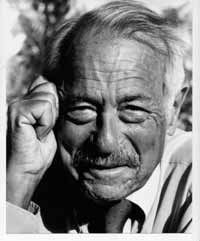Richard Heffner, Host of "The Open Mind" and TC Medalist, is Dead at 88
By Joe Levine
Richard Heffner, whose pioneering talk show The Open Mind, shown on WNET, CUNY and public television stations nationwide, spanned nearly six decades, has passed away at age 88.
Long before there was Charlie Rose or even Bill Moyers, Heffner was sitting down on camera to have deep and illuminating conversations with an astonishing array of the world’s leading figures, a list that grew to include Martin Luther King, Jonas Salk, Gloria Steinem, Elie Wiesel, Gail Sheehy, Norman Mailer, Betty Friedan, Jimmy Carter, Helen Gurley Brown, Arthur M. Schlesinger, Jr., William F. Buckley, Sissela Bok, Robert Caro, Bill Moyers, Mario Cuomo, Ralph Reed and Isaac Asimov. He hosted numerous TC luminaries, including: Presidents Lawrence Cremin and Arthur Levine; anthropologist Margaret Mead; and current faculty member Michael Rebell. Describing his own interviewing style in a New York Times profile in 2006, he said, “The important thing is to let the guest provide the lead. My idea is to let them put their best foot forward intellectually.”
Heffner also moderated many TC book talks and was the focus of one himself, for A Conversational History of Modern American, his compilation of some of his most fascinating interviews, which he published in 2003. Heffner received TC’s Medal for Distinguished Service in May 2005.
Heffner’s wife, the psychotherapist Elaine Heffner (nee Segal), received an Ed.D. in Family and Community Education from Teachers College in 1986. She serves as senior lecturer of education in psychiatry at Cornell University Medical College, and was for many years program pupervisor of the Nursery School Treatment Center at the Payne-Whitney Clinic of New York Hospital.
Heffner, who helped establish public television in New York City, was University Professor of Communications and Public Policy at Rutgers University, where he had taught since 1946. From 1974 through 1994, he also served as chairman of the board and administrator of the motion picture industry’s voluntary film classification and rating system, earning a reputation for taking a harder line on violence in the movies. His other books include Conversations with Elie Wiesel, a collaboration with the noted concentration camp survivor and Nobel laureate; the best-selling A Documentary History of the United States, a verbatim anthology of historic American public documents such as the Declaration of Independence, the Gettysburg Address and King’s Letter from a Birmingham Jail; and another interview compilation, As They Saw It: A Half Century of Conversations from The Open Mind. He also edited the 1956 Penguin edition of the Alexis de Tocqueville classic Democracy in America, which was reprinted in 1984.
While he made ideas the focus of his show and studiously avoided the “he said, she said” format of many subsequent talk shows, Heffner was an avowed New Dealer who believed ardently in a broad role for government. Speaking at TC’s commencement in 2005, he declared “We simply must not be such hapless fools as to be bamboozled into not recognizing what is happening to the best of the American tradition, into not battling with all the means at our disposal against this incredibly destructive counter-revolution, organized by people who have waited so bitterly since 1932 to undo what I once innocently considered a permanent Roosevelt Revolution.”
Richard Douglas Heffner was born in New York City in 1925. His first exposure to Teachers College came at age 13, when a family friend took him to hear a lecture by TC education sociologist George Counts. He later earned both his undergraduate and master’s degrees from Columbia University.
Heffner began his media career in 1953 with the radio show “History in the News” on WMCA in New York. He worked as a radio reporter at both ABC and NBC and then became a television writer, producer and, ultimately, moderator of shows such as Man Of the Year, Princeton ’56, All About Men – All About Women, and, eventually, The Open Mind. Beginning in 1959, he served as an editorial consultant to the CBS, Inc. Editorial Board, and then as Director of Special Projects for the CBS Television Network. In 1961, he played a key role in the acquisition and activation of Channel 13 as New York’s first public broadcasting station. He was the station’s founding general manager.
Heffner worked in many other capacities during his lengthy career. He taught history and political science at the University of California, Sarah Lawrence College and the New School for Social Research. He served as an overseas lecturer for the U.S. State Department. He chaired the 1986 Liberty Conference during the nation’s Statue of Liberty Centennial.
The common thread linking all these endeavors was Heffner’s love of education.
“Broadcast journalism is a means of enlarging the classroom,” he said at his 2003 TC book talk, a point he elaborated on three years later when, for the 50th anniversary of The Open Mind, he traded seats with Bill Moyers and became the interviewee on his own show.
“What do you think is the key to listening?” Moyers asked.
“Being a teacher,” Heffner replied. “It’s wanting to teach, meaning wanting to teach the audience, whatever that audience is.”
Heffner is survived by his wife; their two sons, Daniel, a film producer, and Andrew, former Assistant New York State Attorney General; and four grandchildren.
Published Friday, Dec. 20, 2013
